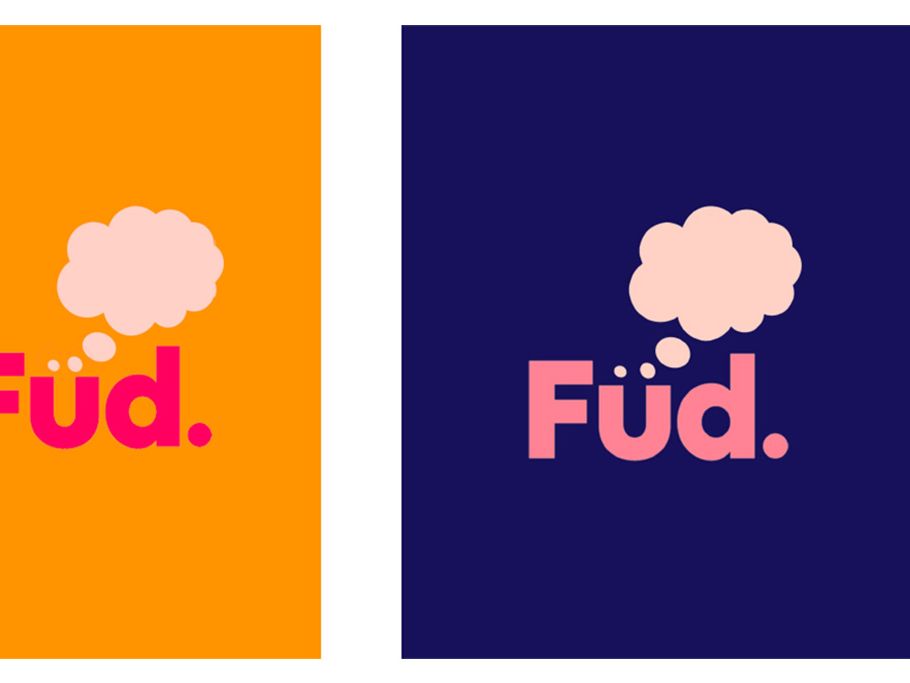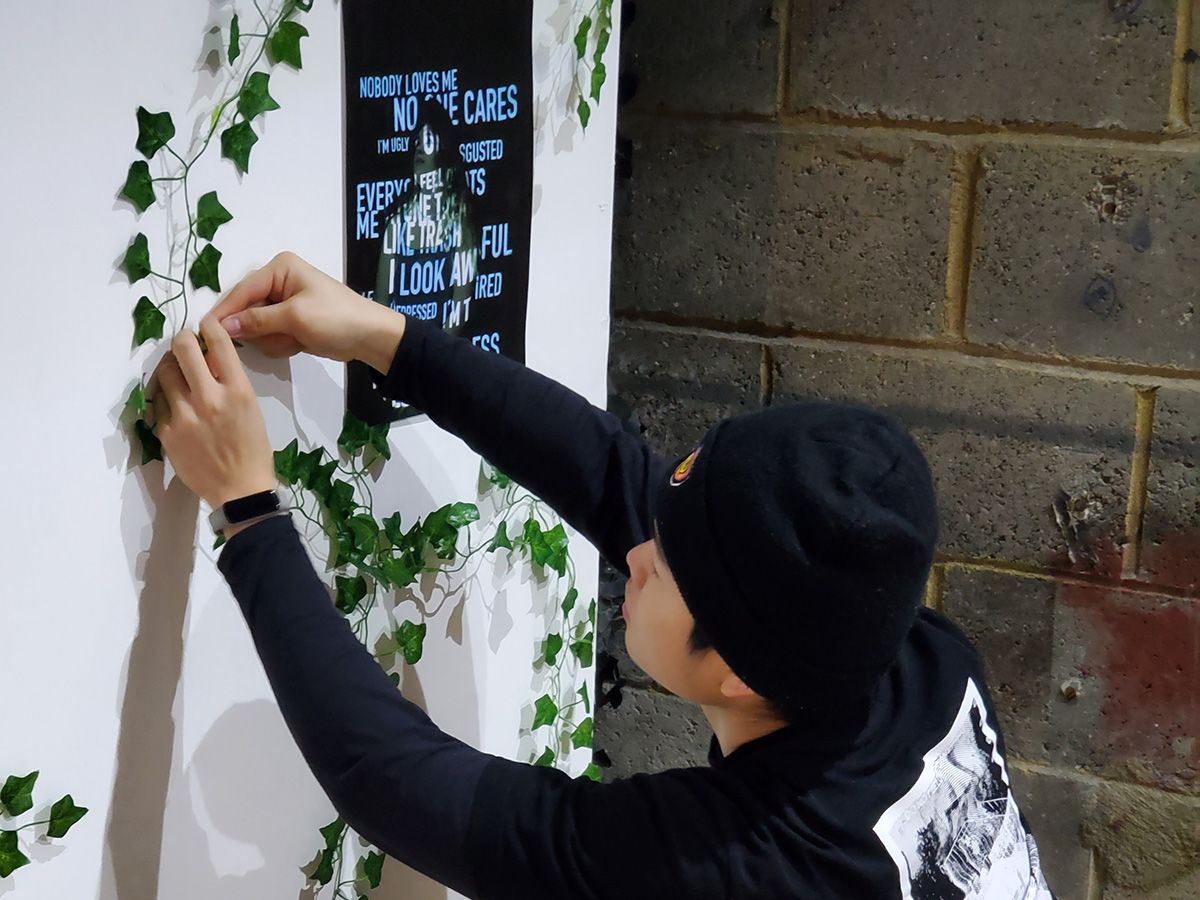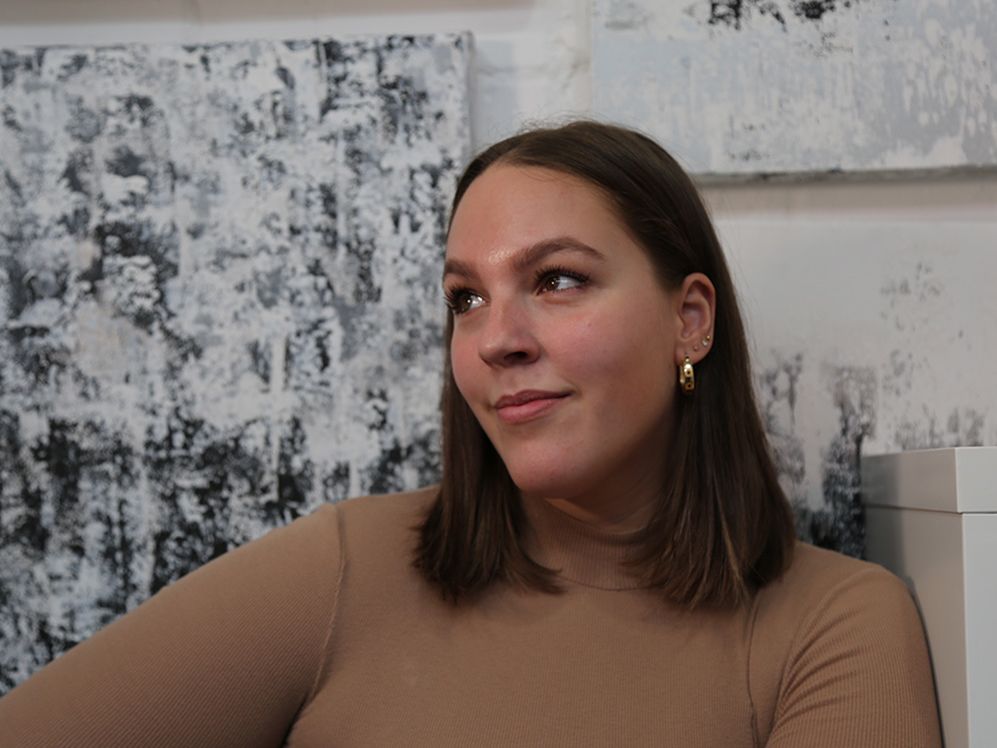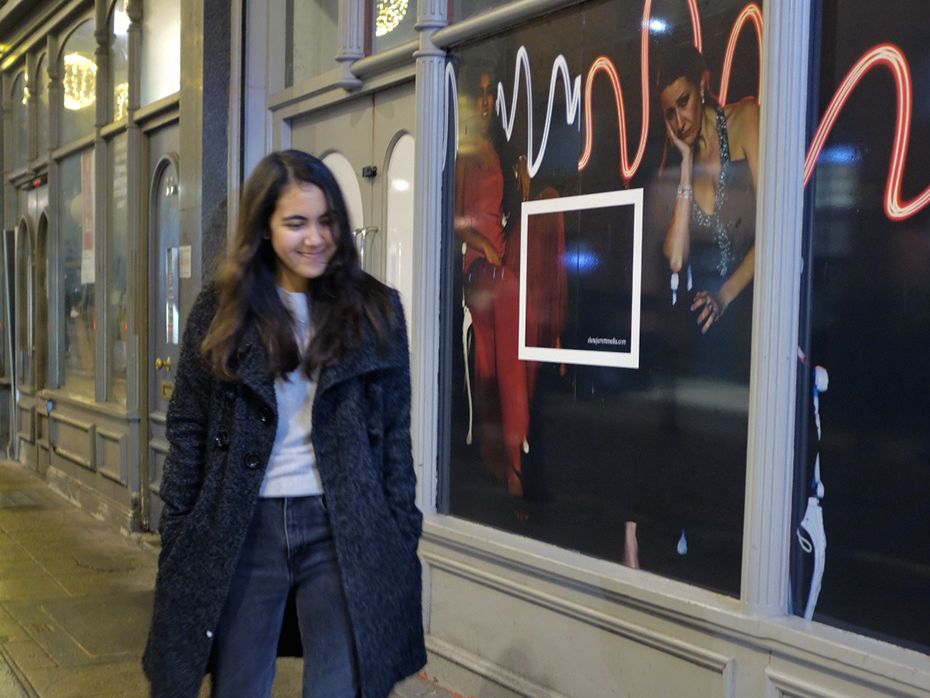
BA (Hons) Magazine Journalism and Publishing students collaborate with Southwark Playhouse
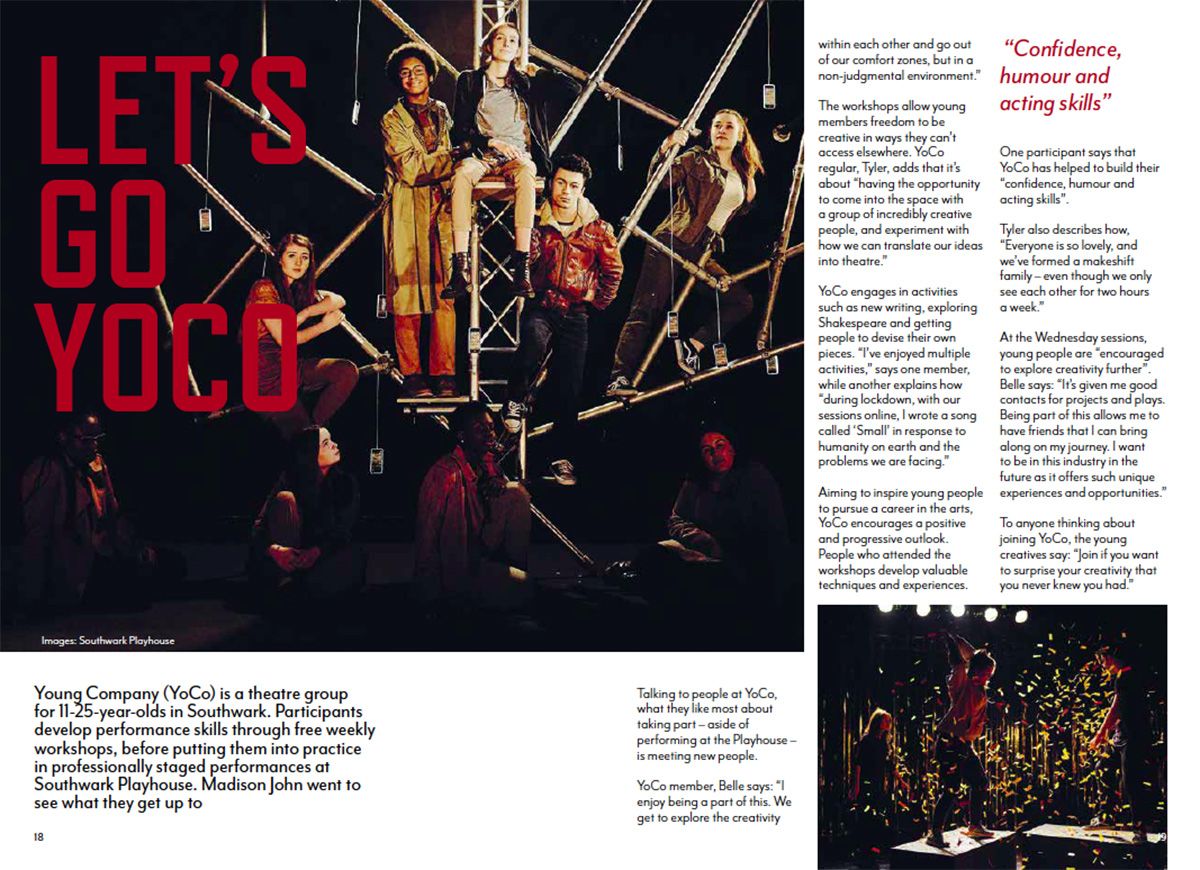
- Written byChloe Murphy
- Published date 25 April 2022

Collaboration is a key aspect of the creative industries, with insights shared in ways that shape, drive and inspire change. It also underpins the ethos of London College of Communication (LCC), where our community utilise their skills across design, media and screen to make a positive difference in the wider world.
Our Year 3 BA (Hons) Magazine Journalism and Publishing students recently gained experience of collaborating with external clients through a project with one of London’s leading studio theatres, Southwark Playhouse. Based near to LCC's home in Elephant and Castle, the Playhouse has become an indispensable part of the city’s theatre scene for almost 3 decades, and focuses on presenting engaging work by emerging practitioners while supporting the creative ambitions of our local community.
As part of their Client Project unit, students were asked to develop a new magazine which explored life at the Playhouse through a series of features and interviews with its staff, performers and creative collaborators. Titled Next Stage, the final publication considers the role of the theatre in providing opportunities and enrichment across the borough, along with details around ongoing and future projects such as the launch of new performance space, which is set to open in 2022.
Students were encouraged to put their skills into action and develop experience across the entire publication process, and were given a range of exciting opportunities to engage with leading Playhouse figures including Chris Smyrnios, Artistic Director and CEO; Savannah Ayoade-Greaves, a member of the theatre’s Black Writers Collective; Gurelaana Mir, Schools Projects Facilitator; actors from the theatre’s Elders Company; and Nicky Hollinshead, who co-facilitates the theatre’s workshops for people with dementia.
"Incisive and thoughtful material"
David Workman, Head of Participation at Southwark Playhouse, explained that the collaboration enabled both organisations to explore the importance and impact of community connections through the lens of creativity.
“When I was approached by LCC, this seemed like a brilliant opportunity not only to engage with one of our neighbours in Elephant and Castle, but also a chance for us to take stock and reflect on all the participatory work that we undertake at Southwark Playhouse,” he said.
“It’s been brilliant working with the students who have delivered some incisive and thoughtful material, which also looks beautiful!”
We caught up with BA (Hons) Magazine Journalism and Publishing student Roz Jones about exploring social infrastructures, the generosity of working with a local arts venue, and the importance of keeping up with developments in the creative industries.

How did you first become interested in the world of magazine journalism and publishing?
I’ve always been an avid reader. After semi-consciously completing a year of software engineering at a different university (having spent most of that time reading about other topics and buying magazines), I realised journalism and publishing was the direction I wanted to go in. I recognised that in this field, there were no subjects left uninterrogated - and in recent times, unrepresented - through beautiful visualisations and sometimes poetry or memoir.
The more I became aware of publishing as discipline, the clearer the benefits of reading printed matter became. If I wanted to learn about the facts and the individual subjectivity of people affected by them, then magazines were always the place to start. I began wondering what it would mean to actually work in the creative industries, and to work with art: 2 things that had always seemed on completely opposite sides of the spectrum.
Tell us about your creative practice.
Like any storyteller, I suppose my priority is people. In all of my work, I try to highlight the subjective experience of any event.
I’m especially interested in urban planning and development, and how this configures people. Infrastructures, both material and immaterial, always create new kinds of people. The London Underground and New York Subway, for example, created the commuter – a new subject who interacts with the world in a new way. I’m interested in the systems of knowledge, cultures and etiquettes created by infrastructure, and the treasure trove of artistic material to be found in how people interact with it.
I’ve always gravitated towards collage, of cut and paste and found material, as I like the idea of treating artmaking and writing like solving a puzzle. I think collage represents a very potent sense of confusion and commotion that’s always been prevalent in my life, and I know that a lot of people feel the same way.
As a South African, and the son of an amajonie (freedom fighter), I’m interested in apartheid and resistance imagery. I grew up listening to stories of resistance and endurance, and I’m always looking for stories where this is prevalent. Hearing about those experiences first-hand gave me an irrepressible motivation to search them out. I’d like to use my creative practice to recreate that feeling.

Why did you decide to study on the BA (Hons) Magazine Journalism and Publishing course at LCC?
From what I could tell, after speaking to a UAL representative and researching the course, it was broad, practical and creative. There were other publishing courses that focused on the business side of the industry, but I wanted to be as creative as possible while also thoroughly exploring more academic concepts. The course promised to satisfy that, which it did.
LCC’s facilities also played a major role in choosing the course. They weren't the main factor, but they certainly helped.
How did you get involved in the collaboration with Southwark Playhouse?
The collaboration was part of our Client Publishing unit, and our lecturers, Mark Barden and Stuart Turnbull, chose the Southwark Playhouse as our external client for the project.
After a long and precarious venue history, the Playhouse has finally secured a 100-year contract at the UNCLE Building around the corner, so we were asked to develop a magazine to commemorate the move: Next Stage.
What inspired the ideas behind Next Stage, and how was it produced?
Next Stage touches on different aspects of day-to-day life at the Playhouse, along with its history and how its future looks. We came up the name when we were brainstorming how to relay that the Playhouse is forward-looking and excited for the future.
Producing it involved working as professionally as possible in the sense that we had to interview key people, liaise with their Head of Participation David Workman, and also design the publication. We spoke to members of their different programmes such as the Black Writers Collective, and the Elders Company, along with show producers, actors and front of house staff to get an idea of how the Playhouse operated on all levels. Our photography was largely in-house as well.
Luckily, David and the team loved the final product so we were able to move onto print without major revisions, and we were also lucky enough to visit the printing press.

What did you most enjoy about taking part in the project?
The project was a lot of fun. It was my first time working with an actual client and being subject to their needs, which gave me a foundational understanding of this massive portion of my sector, and has opened up client publishing as a realistic direction for me. I think this kind of experience is essential for young people going into work for the first time.
The Playhouse team were also a pleasure to work with. They were completely open, giving us backstage access and access to their archives while also being kind enough to offer us free tickets to shows on multiple occasions, which was incredibly generous and showed how they demonstrate their core principles through their actions.
On top of that, David’s feedback was always productive. Everyone had a strong sense of what they wanted but were always flexible when they needed to be, which was one of the key things that made the collaboration so fruitful.
What have been the highlights of your time at LCC so far?
I think the most recent and impactful highlight has been taking part in 14 Stories, which is named after the tower block at LCC. It's a narrative podcast which covers real-world stories of tragedy and endurance.
Our first episode covered the journey of an LCC student losing sight in one of their eyes. I’ve found it really insightful to work with other talented students across a range of courses as we get to flesh out these stories, and it's been an incredible experience to work on an extra-curricular podcast project that allowed me to experiment with screen writing, recording, and producing.
The guest speakers on my course have also been amazing. In my short time at LCC, I've had the opportunity to speak to industry people I look up to, which has been invaluable to my degree. I spoke to Mark Hooper, which indirectly led to me taking part in The Face x Moncler’s mentorship programme. I also had the opportunity to speak to Vince Medeiros, founder of TCO London, a publisher which I respect very much. All of this has made me feel less afraid to enter industry.
And. of course, working with Southwark Playhouse has been wonderful. I had the chance to see a production and speak to people I would’ve never known about otherwise. It opened a new perspective on theatre and sparked an interest that I previously never had.

What advice would you give to other students who might be interested in studying magazine journalism and publishing?
- If you have an eclectic mix of interests, I think Magazine Journalism and Publishing at LCC is definitely the course for you. It offers so many opportunities to speak to professionals in the industry, so I’d say that you should prepare to involve yourself in that as much as possible.
- The course is expansive and broad, and you can really go in any direction with it. Like most other courses, you really get out what you put in.
- Take time to find out where you might go with journalism and publishing in the future, as this will let you know what skills you need to work on.
- More broadly, try to keep up with what’s going on in the world of publishing – it’s big, constantly in motion, and offers so many opportunities. I’d also suggest keeping up with the different kinds of positions available within the industry: one sure way to get out of feeling directionless or without a goal is by getting a thorough understanding of all the roles within publishing and what they do.
- Experiment as much as you can. While obviously respecting your time and health, try to be like Jim Carrey in Yes Man. Answer emails and go out of your way to try new things.
- Magazines are always collaborative efforts, so use your time on the course to polish your teamworking skills. These are indispensable. Also, as a side note, make use of the LCC facilities. You won’t know how good things are until they’re gone!
- There is a publication for you. Whatever your specific interest or niche, there’s definitely a publication out there that will make you see things in a new way. Finding it and exploring other minor interests through magazines will help keep you motivated and curious throughout the course.
- Immerse yourself in the world of magazines. There’s always something going on in London; zine fairs or magCulture events and magazine festivals. These are great places to network and pick up publications, and they’re loads of fun. On top of that, they pretty much always do great student deals.
Related links:
- Read our students' publication, Next Stage, and explore the work of Southwark Playhouse.
- Learn more about studying BA (Hons) Magazine Journalism and Publishing at London College of Communication.
- Experience life at LCC through our interactive Virtual Open Day.
